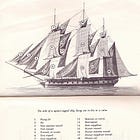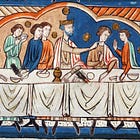Master and Commander - Recap
What we've done; what we're doing next; and a bonus letter from 1780.
There’s more to say about Master and Commander, but we’re going to leave it there for now. If you missed any of the posts, here they are, in order:
This has been fun, so our plan is to keep going to Post Captain, the most Austenian of the novels. I hope you can join us. We’ve been encouraged by the response to this series; thank you for reading along with us.
I don’t know whether we’ll be able to sustain the once-per-week pace that we’ve been on, so please be patient with us. We both have jobs and we’re both working on other writing projects. Dad is revising a contemporary novel set in Prague; I’m writing a biography of John Jervis, the earl of St. Vincent. Travel, too, is going to get in the way. Hopefully there will be more to come.
That was a pretty lame post, above, so here’s something a little more interesting. I read the following letter in Jervis’s papers recently. It illustrates something, but I’m just not quite sure what. Perhaps readers can help me make sense of it.
The context is that Captain John Jervis has taken his nephew Henry Ricketts to sea on board his ship Foudroyant in 1780. Jervis is writing to his sister Mary, Henry’s mother, about her younger son, Edward, and he’s providing advice to his sister about whether Edward should join his brother in the navy. Here’s the key passage:
“[Edward’s] choice of profession must be entirely his own, and he should be made to understand, that I do not encourage it, by any means. That he must lie in the berth with the other midshipmen, live as they do, and have no other destination whatsoever: for the first year, he must rise at break of day, and apply closely to his studies, and to his seamanship; be very subordinate & respectful to all authority over him, and endure all the hardships etc. he is bound to bear, in common with others. The life is a very rigorous one, & what few boys educated as he has been, can bear. If he chuses to embark on these terms, I shall be ready to receive him; but if he disgraces me & his family afterwards, by turning his back, I shall bury in total oblivion his allegiance of blood (which is no tie upon me when unaccompanied by manly virtue) and have no other feeling about him than I should have, for any other different person entrusted to my care, who acted in such a manner, as to not merit my esteem and regard. I forgot to mention that after the first year in which, I expect he will become master of the theory of navigation, he must watch and do his duty with punctuality and alertness, and at least with as much precision as the best midshipman in the ship, for I shall always exact more from a very near relation, than from those I receive on recommendation.
What to make of this? Jervis had a reputation as a stern disciplinarian, so this shoe seems to fit. One way to read this passage is that Jervis was so strict and had such high standards that he would disown his own nephew if he let him down. Jervis never had children, so you could even go so far as to suggest that Jervis would disown his own son. For a biographer, this reading has a satisfying ring to it. What a taskmaster! This was just what the navy needed to whip it into shape! Jervis led by example. Just because you don’t like him (he was clearly a jerk) doesn’t mean he wasn’t effective. He put the needs of the service and the country above all else.
A second way to read it leads to a different conclusion. Jervis was very close to his sister and wrote in other contexts about how happy he was to have her sons aboard his ship. He says at the outset of this letter that he doesn’t think Edward should join the navy. I wonder if, in fact, he’s writing to Edward, expecting his mother to read out loud to him the relevant passages about how hard life at sea is. Jervis worries (in other letters) that Edward and Henry should serve on different ships to hedge against one catastrophic shipwreck killing both of the Ricketts boys. Also, he sent regular glowing reports about Henry to his sister, and he used his considerable powers of patronage to advance Henry’s career in the navy. Therefore, this letter is actually a red herring: Jervis would never disown his nephew for disobedience—he just didn’t want both Ricketts boys in the navy. He may have also worried that Edward wasn’t cut out for a life at sea.
I’m leaning toward the second explanation even though the first is exactly in line with Jervis’s historical reputation and even though the second relies heavily on inference from reading hundreds of other letters. Such are the challenges of biography!










I wonder also if it wasn’t a bit of caretaking for both personal and family reputation in a time and a service in which having good reputation personally and ties to a family of good reputation was important and highly prized?